

PRAJNA Counseling Centre - Engagement for women and children in distress since 25 years
By Lea Diehl, a Volunteer from Germany
Bellevision Media Network
- The PRAJNA Counseling Centre celebrates its silver jubilee
|
Lea and Octavia did documentation and office work, gave English tuitions, spent time together with the girls of the children’s home and taught them games, handicrafts and songs and gave emotional support. Lea also taught handicrafts to women of PRAJNA’s short stay home and wrote down life stories of children for sponsorship. Lea took initiative and developed a website for PRAJNA: www.prajnacounsel.in. After completing their 6 months stay in PRAJNA Lea and Octavia are on a tour of India. Lea says that once she goes back to Germany, she would like to continue higher education in German University. |
Mangalore, 15 April 2012: This year the non-government organization “Prajna Counseling Centre “based in Mangalore, a city in the south-Indian state Karnataka, celebrates its silver jubilee. The engagement of the Centre has been distinguished and unique. The dimension of care for families and communities living under the most different circumstances is incredible.
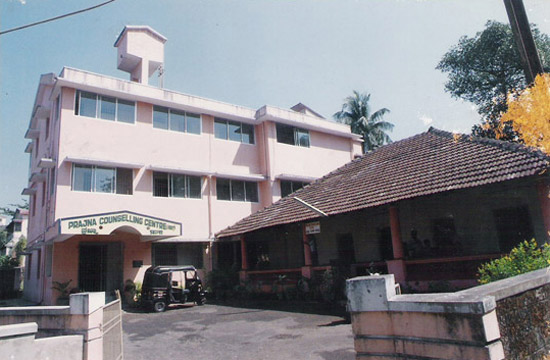
The familiar atmosphere in the Counseling Centre and the heartily individual care of the patients is an outstanding commitment. PRAJNA is more than a service Centre for treatment and rehabilitation. It is a place of hope and reliance, a memorial point which has changed the lives of a huge number of people.
Prof. Hilda Rayappan, the chief of the Centre is an impressive and outstanding person, who earns the respect of people from the beginning. She has been influencing the minds of due to her natural and kindly character. Hilda Rayappan has devoted her life to the poorest of the poor and has always kept sight of her commitment to the Centre.
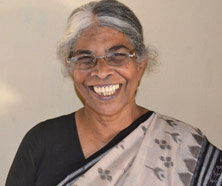
Prof. Hilda Rayappan
Coming from a marginalized family and having grown up in a remote area, Hilda Rayappan greatly empathizes with similar types of people. Her family had migrated from Tamil Nadu when she was a small child, and she had to suffer from discrimination and social exclusion due to her background. When someone asks Hilda Rayappan about her family, she says confidently: “My parents were poor, but their values have been rich!” Her deep faith and her strong conviction have helped her to reach her aims.
Since its inception in 1987, PRAJNA has empowered women and children in distress and built solidarity and emancipation for marginalized groups and deprived communities. The main aim of the Centre is the protection of human being and the enlightenment of the society. The thrust is the awareness building towards human rights and the attending for marginalized people with respect and dignity.
Services in all imaginable fields of social work:
The commitments of PRAJNA are complex and multilateral. The multiplicity of services in numerous fields of social work is outstanding. The Centre supports children and women in different circumstances and offers care and perspectives for families in distress.
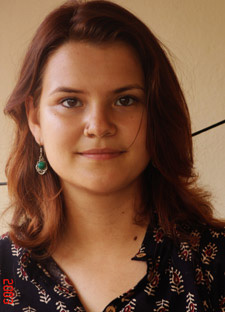
Lea Diehl
The Centre has benefited women who have been victims of sexual abuse, marital and inter-familiar conflicts, who are in conflict with justice or suffer from mental and physical challenges. It has supported destitute and harassed children, child labours, school-drop-outs and drug addicts and has created an adequate environment for families in distress. PRAJNA has initiated programmes for HIV affected persons as well as alcohol and drug addicts and has been offering considerable encouragement for low income communities and abandoned people living in slum areas.
Through government funded programmes, as well as through the financial and advisory aid of international sponsors,the facilities and opportunities of the Centre have grown and expanded. Qualified counselors and social workers have been undertaking effective and convincing services for the development of the Counseling Centre and the encouragement to the poorest of the poor in the Indian society.
Much more than therapeutic counseling:
PRAJNA has been the first non-government organization in Karnataka who has initiated a Therapeutic Counseling Centre which was established in 1987. The aim has been the empowerment of individuals and increasing of communication in families. PRAJNA has focused the process of self-expression and personal awareness, which the Centre undertakes through personality building programmes for individuals.
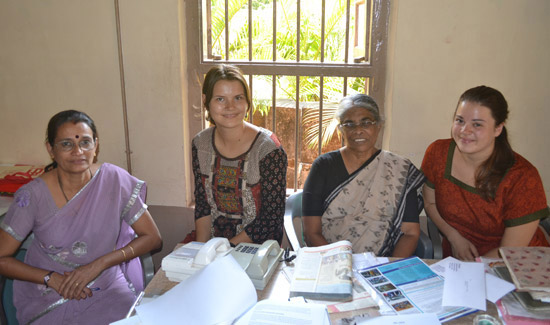
The Centre had started with the service of counseling, but the description “Counseling Centre” has not sufficed for a long time. The untiring engagement of Prof. Hilda Rayappan has increased manifold and the Centre has enlarged its activities.
From the beginning, PRAJNA has started projects for the empowerment of families, particularly women and young girls and focused the evident problem of gender discrimination. The organization has realized the need of adequate initiatives for specific challenges of different families anon.
Rehabilitation for drug addicts:
Harassment against women and girls by addicts is a focused problem in the society, which has split families and communities. Especially alcoholism is a serious issue, which affects 35% of families living in and around Mangalore. In order to meet these challenges, a team of professionals had started a rehabilitation Centre for de-addiction in the Nineties. PRAJNA was the first NGO in the Karnataka state which has established a centre like this and has also organized different awareness camps and community-based workshops along with it.
The first initiative for HIV-positives in the state:
At the same time PRAJNA has realized the problematic situation of HIV in the society and started engagement for HIV positives as the first NGO in Karnataka State. In addition to the physical effects of the disease, there are other consequences which destroy a number of families. Discrimination causes isolation - HIV in- and affected children live in distress and need proper care and protection. HIV-infected parents are often incapable to care for their children. They are unable to work and for this reason children become child labourers and school-drop-outs.
In many cases, HIV-affected children miss their chance for education.Therefor PRAJNA has successfully initiated a pediatric initiative for children suffering from HIV. Through familiar-oriented counseling and mental support children recognize perspectives and find living facilities through proper care by relatives, single-parents and foster families. PRAJNA has successfully conducted workshops and awareness programmes to educate women, children and employees in different fields about the fatal risks of AIDS and the protection against HIV. Through its engagement the Centre works confidently against the contemptuousdiscrimination against HIV-positives.
Proper care for abused women:
Around 64% of the women and girls in India have been victims of sexual abuse. Many women suffer from marital problems or family conflicts and are abandoned. PRAJNA has initiated a women help-line to offer telephonic guidance for needy women, funded by the government. The Centre also provides shelter for women with children up to three years.
Shelter for children in distress:
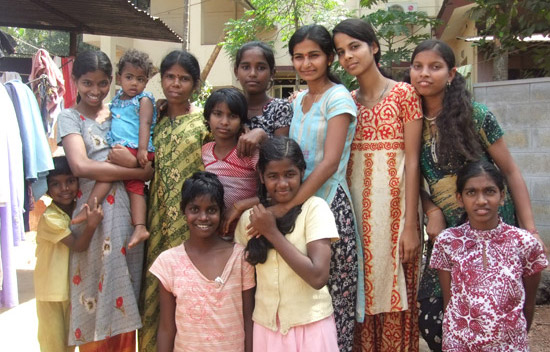
Around 19% of the world’s children live in India. A third of Indians are below 18 years. 40% of these children need protection and adequate aid through professionals. PRAJNA has offered different concepts of shelter home for marginalized children and cares mainly young girls in distress. Children, who are victims of violence, sexual abuse or harassment, find professional help through proper care and professional counseling. The children’s homes of PRAJNA accommodate children who have lost their parents on account of severe diseases like HIV or tuberculosis or abandoned and neglected or had to live in slum areas or on the roadside. Many of these children have been child labourers or school drop-outs. Especially the employment of children as domestic workers or service providers is a common and unsolved problem in the Indian society. Through the Counseling Centre, children get nutritious food and shelter and experience loving care through engaged foster mums.
Engagement against child labour and adequate services for illiterates:
Almost 16.5 % of the population in and around Mangalore cannot read and write their local language. The novel concept of transit home for illiterates, which was established last year, is an elaborate and convincing attempt.Through modern learning methods children get basic knowledge and extensive preparation for their further school studies. It is necessary and indispensable that illiteratesand school drop-outs get adequate pre-education before thesubmission to normal schools and collective education in age-groups.
Through special programmes and regular meetings, parents are well involved in the learning process of their children. PRAJNA is proud to administrate its long planed project and follows its important aim intensely. Education is a basic need and vocational training is decisive for the further life of every child. The understanding for the importance of education increases through the new concept of transit home. Children are the future of the society and the responsibility for the next generation grows along with the engagement of PRAJNA.
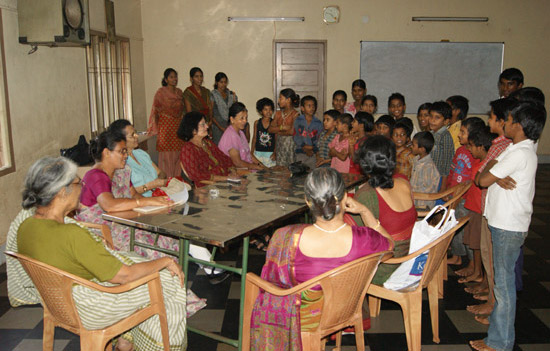
Realizing importance of education and the reflected process of learning, PRAJNA has also followed through different awareness programmes on a community-focused basis. In the last 25 years the Centre has successfully held workshops about women and children right’s, health and medical care, nutritious food and self-empowerment. Through different projects, PRAJNA has succeeded the formation of a positive network between families, communities, societal groups, politicians and officials and has built relationships between a number of different non-governmental organizations.
Perspectives for inhabitants of neglected areas:
In slums and remote areas people live under the borderline. The income of the villagers is very low and essential agents are absent. Frustration breeds alcoholism, sexual crimes and violence. PRAJNA has been working hard to help people who are marginalized and live in poverty.
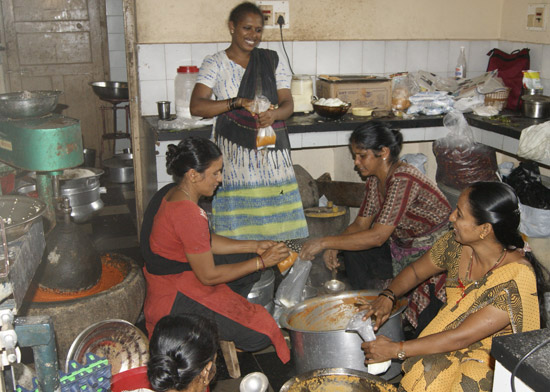
PRAJNA has initiated different projects to empower people suffering from poverty. The Centre has organized group-activities and community based programmes as well as awareness building projects and educational trainings. Through self-help-groups for women, the income of villagers has increased. Women get the knowledge about financial issues and an understanding of the economy.
Empowerment through participation:
The Centre has been focusing on the engagement to increase democratic understanding and reflection. The self-help-groups as well as PRAJNA’s children’s parliaments and the child-right-clubs at schools should help to build their own opinions and get the understanding about democratic processes. PRAJNA also informs women and children about the possibilities of Panchayat and empowers them to get involved.
United work for excluded:
The innovative project “Meal on Wheal” manifests PRAJNA’s understanding of united initiatives. All the workers of PRAJNA, counselors as well as social-workers and the kitchen-team do several services to cook and dispense hygienic and low cost food for lorry-drivers and construction workers. The women of PRAJNA’s shelter home get involved and empowered through employment. The little profit that the project earns is being utilized to support children and women in distress.
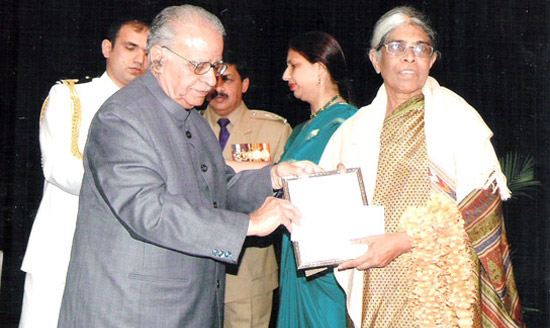
All the named projects are just examples for the plurality of services PRAJNA has been offering since last 25 years. The jubilee of the Centre will be on the 16th of April. The employees of PRAJNA and facilitators as well as sponsors and patients are proud to celebrate it one day later. The function will take place in Milagris Church Hall, Hampenkatta, Mangalore. The celebration on the 17th of April will be from 11 a.m. to 3 p.m. Around 1500 participants are expected to attend the Silver Jubilee programmes of PRAJNA.
For further information visit the homepage of the centre: http://www.prajnacounsel.in/
 Lea Diehl along with Octavia came to India from Germany for social work and cultural learning through a German NGO called "Karl Kübel Stiftung", which is partner of the Prajna Counseling Centre in Mangalore. Every year volunteers from Germany are sent to different Indian NGOs in pairs of two. Lea and Octavia came to Prajna as volunteers in September 2011 and became involved in different fields of PRAJNA.
Lea Diehl along with Octavia came to India from Germany for social work and cultural learning through a German NGO called "Karl Kübel Stiftung", which is partner of the Prajna Counseling Centre in Mangalore. Every year volunteers from Germany are sent to different Indian NGOs in pairs of two. Lea and Octavia came to Prajna as volunteers in September 2011 and became involved in different fields of PRAJNA.